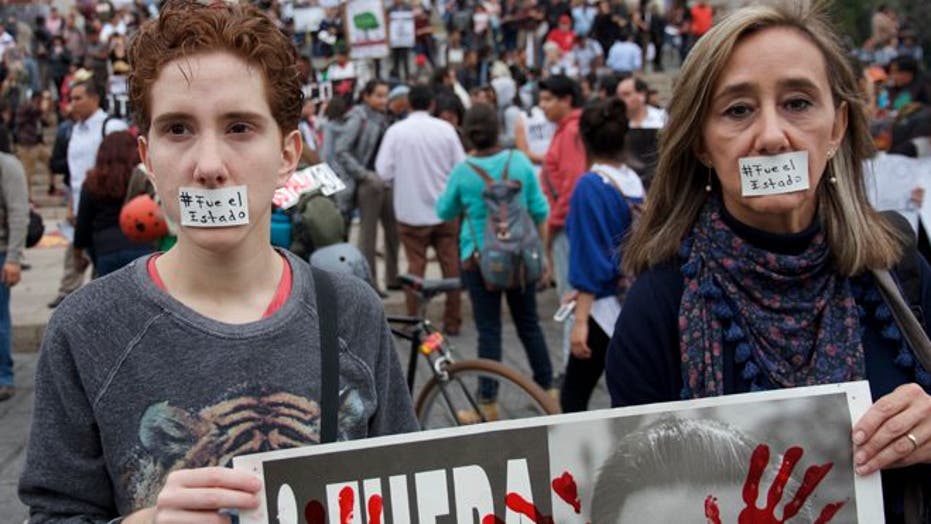Mexico City, Mexico – Six months have passed since the disturbing disappearance of 43 young Mexicans in the town of Iguala, in the dirt-poor, crime-ridden southwestern state of Guerrero.
But half a year later, there is still no consensus as to what exactly happened to them, after they were arrested by corrupt local police officers on the night of Sept. 26, and now, relatives of the students and their supporters are demanding that the June 7 elections in Guerrero be postponed.
Parents of 43 missing students marked the anniversary with a march of a few thousand supporters in Mexico City on Thursday, urging fellow Mexicans not to abandon them.
"This is not just about the 43, this is about the 26,000 Mexicans who are still missing,” Miguel — one of people who lined Mexico City’s Reforma avenue and who requested that his last name be withheld for fear of retribution — told Fox News Latino.
"This is an internal war," he said, “a war against the Mexican people."
Also on Thursday, the Attorney General's Office issued a statement reiterating that the government had conducted a transparent and exhaustive investigation. It said 104 people had been detained in the case, including 48 from the Iguala police force.
Only one victim's remains have been identified, however, and parents of the young men have continued to demand answers.
The 43 indigenous aspiring teachers left their college in Ayotzinapa, also in Guerrero state, to protest against President Enrique Peña Nieto’s educational reform.
Iguala was only supposed to be a stopover for the students, who intended to travel to Mexico City for a commemoration of the 1968 Tlatelolco massacre – a bloody incident in Mexican history that involved the death of dozens of students and civilians at the hands of military and police officers.
According to the official timeline, the town’s mayor, José Luis Abarca, gave the order to arrest the students, who were taken by corrupt local police officers and handed over to members of the local cartel, Guerreros Unidos. The students were then killed, their bodies burned, the remains put into plastic bags and thrown into a nearby river.
As far as the federal government is concerned, the mystery of the missing students has officially been solved. On Jan. 27, then-Attorney General Jesús Murillo Karam announced in a press conference that there was sufficient evidence against the police officers, Guerreros Unidos gang members and Abarca and other municipal officials who have been arrested, to close the case.
With a supposedly solved case and a new attorney general, Arely Gómez González, the Mexican government had hoped finally to put the tragedy to rest.
The students’ disappearance has brought unwanted negative attention to the country and its president, hurting his image internationally and causing his popularity in the country to plummet. According to Mexico’s newspaper of record, Reforma, the administration’s approval rating is at a low 39 percent.
But the students’ relatives refuse to accept the official story and are still pressing their case in the U.S., touring the country in caravans to build support in the immigrant community, and before the United Nations.
The Argentinian Forensic Anthropology Team (EAAF) — the group that worked with Mexican authorities in the investigation—who have also asked that the case remain open, having pointed out earlier this year several irregularities in the inquiry.
Protesters are now focusing on the upcoming legislative elections in Guerrero, demanding that the vote be canceled.
At the demonstration in Mexico City, people from Guerrero were yelling: "We don't want closed ballot boxes, we want an open popular vote!"
One man named Anibal, who also requested his last name withheld, said to Fox News Latino, "Why vote when we know their individual interests will come first? In the case of Iguala, everybody knew the mayor was involved with narco-traffickers, including the government, but they didn't do anything.”
He added, “We don't trust them."
The Associated Press contributed to this report.







































